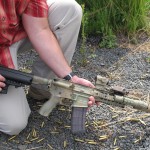Background
This page is no longer being updated. For ongoing coverage of this topic, go to Boise State Public Radio’s website.
There are at least 180 firearms and ammunition makers in Idaho, and the state is looking for more.
After all: Idaho is a gun-friendly state. Why not encourage gun manufacturers to come in and set up shop?
Several years ago, that logic led Idaho’s Department of Commerce to begin recruiting “recreation technology” companies. The term refers to makers of all sorts of outdoor equipment, but the department’s most prominent pitch was to firearms and accessories manufacturers.
In the process, state representatives have touted not only Idaho’s tax structure and comfort with firearms — as in this video, from 2011 — but also its firearms-friendly regulatory environment.
That last part begs the question: If states want to attract gun manufacturers, can they improve their odds by altering state statutes?
The federal government requires that firearms retailers be licensed, and that licensed retailers do background checks. It seeks to keep firearms out of the hands of convicted felons and people with a history of mental illness. (An important caveat: As The New York Times reported last year, many states have passed measures allowing those who have experienced mental illness to petition to have their gun rights restored.)
States can enact more stringent regulations, but Idaho has not taken that route. “They’ve added no restrictions above and beyond the federal-level restrictions,” Center to Prevent Gun Violence attorney Lindsay Nichols says of state lawmakers.
However, she points out, Idaho is far from alone in that, meaning state statute is unlikely to be the primary recruitment tool.
“There are plenty of other states that have weak gun laws as well,” Nichols says. “The decision to exist in Idaho rather than any other state isn’t likely to be based on purely legal elements.” Culture, she says, is a more likely draw.
Fred Newcome, a spokesman for PNW Arms, an ammunition manufacturer that recently relocated to Potlatch, says this was the case for them. “Idaho offered us an opportunity to relocate somewhere where we could be in a more comfortable environment,” he says.
What does that mean? For one, he says, in Potlatch the company found an enthusiastic and knowledgeable workforce. “When folks come here, they understand that what they’re doing is of vital importance to our national interest, and they take that to heart,” Newcome says. “What they’re doing is participating in something they believe in deeply.









